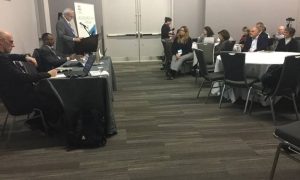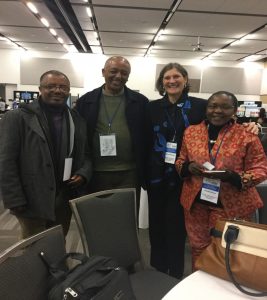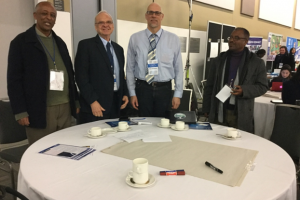The roles of Teacher Education and Theological Institutions in contributing to Education for Sustainable Development (ESD) and Global Citizenship Education (GCE)has been recognized. This was observed in an event of UNESCO Week for Peace and Sustainable Development: The Role of Education held in Ottawa, Canada from March 6-8, 2017.
The Ethiopian Graduate School of Theology (EGST) in collaboration with Leuphana University Luneburg, Germany engaged in a debate on education for sustainable development focusing on the role of education and educators. The concurrent presentations on Engaging Teacher Educators with the Agendas of Sustainability and Global Citizenship: Mapping the Terrain with a Case Study of a Pilot Professional Development Program from Ethiopia by EGST and Leuphana University was an outcome of the pilot professional development program which began in 2015 and soon to be published in the International Journal of Sustainability in Higher Education.
The case study argues that despite broad consensus on the implementation of education for sustainable development (ESD), there is so far an apparent lack of practical experiences and solid research on approaches that effectively manage to engage professional educators in higher education with ESD in the context of a developing country from the Global South. The debate addressed this gap, starting with a case study from a pilot professional development program (PDP) that sought to implement and mainstream ESD among Ethiopian Colleges of Teacher Education (CTEs) and Theological Colleges (TCs).
The Ethiopian case study is used as an example for the Sub-Saharan context against the backdrop of actual discussions around ESD and GCED besides the Agenda 2030.
Questions debated with the audience include how education-related SDGs be adequately addressed in a Non-Global North perspective? What approaches are needed in order to empower institutions like CTEs and TSs to combine human capacity and institutional structure building? What are the specific challenges for implementing and mainstreaming ESD and Global Citizenship Education Development (GCED) in Ethiopia and beyond? What challenges of finding donors and funding agencies for North-South-(South) cooperation can be identified and how are they to be tackled?
Organized and moderated by Professor Maik Adomssent of Leuphana University and recommended by Professor Charles Hopkin of York University and UNESCO Chair of the International Network of Teacher Education Institutions (INTEI), the debate inspired a live discussion among the participants focusing on the roles of Colleges of Teacher Education and Theological Institutions in Ethiopia. Questions raised include sustainability issues to continue the pilot, the focus of the target group, impact of the pilot, the use of e-learning approaches, and the future roles of theological institutions for enhancing ESD.
The speakers Aklilu Dalelo, Associate Professor of Geography and Environmental Education, Addise Amado, Head of EGST Development and Communications, and Charles Hopkins, UNESCO Chair in Reorienting Teacher Education, York University, Canada addressed these and other issues raised during the debate.
The discussion further tackled the questions on the double challenge for education within the SDGs to help achieve the SDG goals; to specifically address SDG 4 on quality education (i.e. 4.7), and to raise the question whether and how education itself has to change against this background.
The Ethiopian example, encompassing both Colleges of Teacher Education (CTEs) and Theological Seminaries (TSs) was discussed more deeply by carving out contrasts and commonalities of different teacher education approaches represented in different parts of the world. “The engagement of theological institutions in this process is something we did not expected but a generous gift to us to enrich the debate” Professor Charles remarked.
At the back of this achievement is the establishment of Center for Environmental Stewardship and Holistic Development, CESHoD at EGST where the partnership with Leuphana University Luneburg played a catalyst role. Through this partnership eight colleges were engaged in ESD in Ethiopia with two regional networks operating in SNNPRS, one for CTE and the other for TS.
It was further recalled that EGST has participated in the Visby Conference on ‘Bridging the Global Action Program/GAP – Educators and Trainers’ and contributed to the Visby Recommendations for enhancing ESD in Teacher Education organized and published by the Swedish International Centre of Education for Sustainable Development (SWEDESD) in August 21-24, 2016
The event further opened doors to promote EGST and linkage to different international organizations and higher educational institutions.
Networking opportunity with likeminded organizations: from right to left Aklilu and Addise with Dorcas B. Otieno, Founder and CEO, Kenya Organization for Environmental Education and Roz Ice, Professor and researcher in 20 countries and at a United Agency. She specializes in sustainability and education and hosts a website at: www.sustainabilityandhristianity.org



